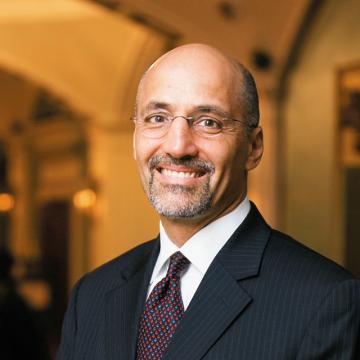Time, spectacle, and the success of the next president
In just one year, America will inaugurate a new president. What the winning candidate says in the coming months of 2016 may well determine success or failure during the new president’s critical first year in 2017.
In every presidential election, candidates are tempted to say anything that wins public attention.
The 2016 race has driven this imperative to new heights … literally. The primary debates have been ratings blockbusters, with the GOP debates averaging nearly 20 million viewers per episode—almost double the average of 10 million viewers in 2011-2012.
That means two things for our next president. The good news: He or she may be able to bring new voters along who not only help them get elected, but who also help break the political gridlock. The bad news: The outlandish things candidates say to garner attention may come back to haunt them.
And the longer the primaries last, the greater the risk candidates run of undermining their ability to govern if elected. The duration of the 2016 primaries is not a trivial issue for 2017.
Of course, the race could end early. In the GOP, if either of the current leaders, Donald Trump or Ted Cruz, sweeps the first four states to vote, he might then have unstoppable momentum going into March, when bigger states go to the polls. Mid-March primaries in Florida, Ohio, and Michigan are particularly important, since the winner will take all delegates.
A decisive winner across these states would be well on his way to the nomination, despite the fact that many observers suspect that neither Donald Trump nor Ted Cruz can consistently collect any more than 30%-40% of the GOP vote.
Indeed, many analysts are planning for a longer contest. If neither Trump or Cruz consistently dominates early on, and if enough other survivors stay in the race, the contest may remain undecided for some time. With a large GOP field, and a number of different winners in different states, the race could last well into April or May.
And that will only lead to greater incentives for candidates to say anything to further stand out from the crowd. Those high-visibility comments have untold consequences within the parties, let alone for what it will mean to govern if elected.
Donald Trump clearly has a gift for saying things to drive up visibility for the GOP face. What is less clear is whether he is expanding the party’s supporters—particularly with his foreign policy pronouncements. Sure enough, some traditional Republicans support his views on immigration—from expecting Mexico to pay for a huge new border wall, to stopping all Muslims from entering the country—even if party leaders have expressed outrage.
But on other issues, such as criticizing President Bush’s 2003 decision to invade Iraq or praising Vladimir Putin, Donald Trump is not a traditional Republican. His unorthodox statements may be driving traditional Republicans away.
A similar trend is developing among Democrats. Bernie Sanders’ liberal positions on foreign affairs include promises President Obama couldn’t keep, such as slashing defense spending and promising to shutter Guantanamo. Hillary Clinton also has parted company with President Obama, promising to establish a no-fly zone in Syria.
If any one of these candidates are elected…what then?
Regardless of who wins, the president’s first year is particularly critical. Even if elected with a narrow mandate in 2016, the new president has a unique opening—and the political capital—to work with Congress in 2017.
Fifty years ago, Lyndon Johnson famously said, “No matter how big a majority you are elected with, you’ve got just one year when [Congress] treat[s] you right, and before they start worrying about themselves.”
Yet dramatic political polarization in the last five decades has made it harder for presidents to take advantage of their honeymoons, and for Washington to work effectively.
That will be harder still if the new president, over a long election year, has left a trail of high-visibility statements that make him or her more suspicious in the eyes of the other party.
Would President Donald Trump follow through on charging Mexico for a new border wall? Would President Ted Cruz really use American bombs to target the families of ISIS leaders? Would President Bernie Sanders actually shut down the Guantanamo Bay prison camp? And would Hillary Clinton establish a no-fly zone over Syria?
Domestic politics and complex foreign affairs make each of these promises hard to implement.
The spectacle is great for a long campaign. But it is often vexing when it’s time to actually govern the country as commander in chief.
